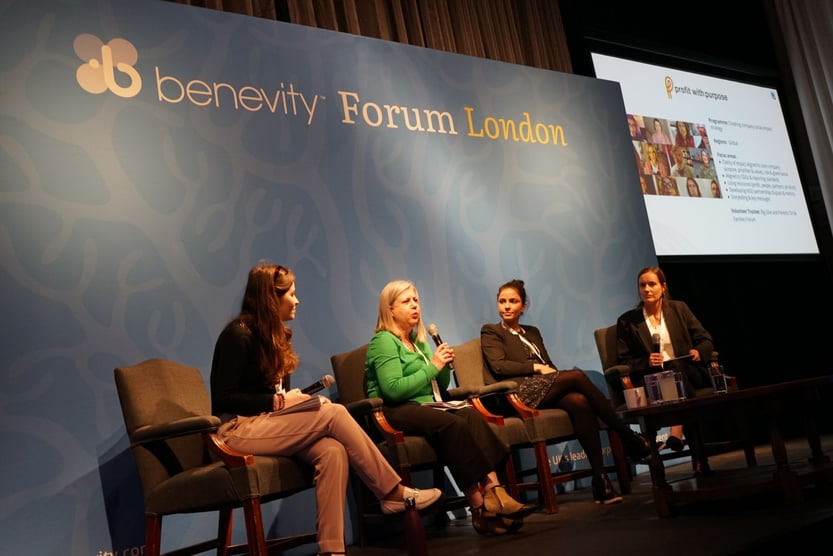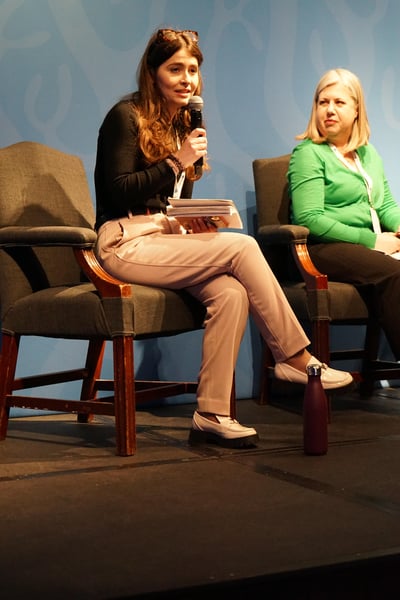Corporate purpose in a cost-of-living crisis

The past year has seen the cost of living crisis assert itself on the corporate agenda – pushing companies to reimagine their social impact planning in line with new issues and needs.
Due to the nature and scale of the crisis, this was one of the main topics of conversation at the Benevity Forum London, where we were able to hear from experts about how companies are adjusting their corporate purpose strategies to respond to the crisis.
Here are the main topics that came up when discussing the cost-of-living crisis.
Driving corporate impact during a cost-of-living crisis
Increased housing costs, higher food prices, limited disposable income. The cost-of-living crisis has posed a number of challenges, causing all of us to reexamine our financial situations for the years to come.
In unprecedented times, there’s a significant need for social action – with far fewer resources. This is causing companies to reevaluate how to best galvanise action around social impact initiatives, particularly as stakeholder challenges and limits shift.
Here are some of the ways that CSR experts at the Benevity Forum London suggest approaching corporate purpose alongside the challenges of a cost-of-living crisis.
Shifting away from the notion of charity
Right at the top of the conversation, Christiane Meyer, Global Head of Booking.com Cares at Booking.com, framed the topic for attendees by challenging the common idea of charity as it exists today.
From her perspective, thinking of our work as charity doesn’t help the business. This is because it builds inequitable relationships, where the “powerful” giver provides something to the “needy” recipient.
This way of thinking doesn't acknowledge how much the giver in this scenario actually benefits and it doesn't acknowledge how much the recipient contributes.
Christiane Meyer, Global Head of Booking.com Cares at Booking.com
Starting from there, we were able to delve into how companies can shift this power balance and provide real support during difficult economic times like the ones we face today.
Developing and implementing a response framework
One of the main topics of conversation was the importance of developing and implementing a comprehensive, but flexible, response framework for handling social initiatives during a crisis of this scale. This framework should outline who your stakeholders are, their needs and your resources – so you can better identify where you can actually make an impact.

Legitimising your social impact activities in this way not only helps structure your response to the crisis but also enables you to keep track of the metrics you need to measure against core legal standards. The need to adhere to new legislation is making these CSR frameworks more and more important and is a helpful tool in bringing these initiatives to life.
Plus, these frameworks and metrics also ensure that you’re sticking to all your CSR ambitions. Isabel Kelly, Founder and Principal Consultant at Profit with Purpose, highlighted the importance of ensuring that your social action doesn’t waiver over time. By outlining initiatives into a framework, objectives don’t exist in a silo, meaning that companies are held accountable.
If you have core metrics that you're reporting on publicly or internally every year, that stops you from stepping back on those objectives. It might mean that you add others or you slightly pivot or change the emphasis. But you've got to have that continuity.
Isabel Kelly, Founder and Principal Consultant at Profit with Purpose
These frameworks should be sufficiently flexible to address crisis issues, but frameworks cannot address every issue. Rather, set yourself a North Star – your profit and purpose objective – to guide which initiatives your company is suited to support and how you can support them.
Speaking directly to charities and beneficiaries
Developing initiatives that appear to be beneficial at first glance is likely during a crisis of this nature. That’s why speaking to charities and beneficiaries to get their feedback on the impact of your efforts is essential.
As part of their response to the cost-of-living crisis, Sodexo developed a plan to help beneficiaries access job opportunities within Sodexo’s Stop Hunger Foundation. The idea was to give people in need of work the opportunity to join the team. Camille Thobois, Sodexo Stop Hunger Foundation Lead - UK & Ireland, ran this by the charities in question and received helpful feedback regarding their beneficiaries, like how beneficiaries could afford transport to the site or whether they could commit to full-time roles.
These conversations with the charities led to Sodexo modifying the programme to consider best-fit locations, transportation budgets and flexible working options. All of which are crucial in delivering real impact during a crisis.
Supporting the internal adoption of social impact initiatives
On the other side of the communication coin is talking to your internal stakeholders about how they can support your social impact initiatives. This is especially important at big companies, where employees at distinct levels lead very different lives and circumstances. 
During a cost-of-living crisis, many employees are stressed about their own resources, as suddenly their paycheck is stretched much further than before. This makes it a challenge for companies to promote fundraising like they would under normal circumstances.
For this reason, Sodexo paused fundraising to focus on volunteering so that their people could focus on giving their time rather than their money. However, they then received the feedback that a lot of people had too much going on to volunteer.
This required Camille to speak with the leadership team about the importance of highlighting social impact initiatives as a business priority, particularly with middle management. This kind of buy-in from key stakeholders is crucial for garnering programme participation, particularly in difficult times like these.
She shared, "Everything that we do through the foundation creates social value, but then it's on us to articulate that social value in a way that then the commercial side of things can reutilise to complement their internal policies and that is how you create that really virtuous cycle."
The company sees the impact, therefore they invest more. Therefore we can go on supporting a need, hopefully addressing the cost-of-living crisis a bit more effectively. Then you just continue with that loop.
Camille Thobois, Sodexo Stop Hunger Foundation Lead – UK & Ireland
Christiane also highlighted how the different departments in your organisation each play a specific role in delivering purpose, much like they do in delivering profit. It’s about communicating as a team and considering how you can show up from a compliance perspective, from a good corporate citizenship perspective, from a talent management perspective and so on.

Considering your company's part in the cost-of-living crisis
While on the topic of playing your part, Isabel also underlined the need for companies to take a look at themselves and consider the role they play in the cost of living crisis.
Look at your own people and be a living wage employer at least. But then look down your supply chain. Is all your supply chain a living wage employer?
Isabel Kelly, Founder and Principal Consultant at Profit with Purpose
This includes considering whether your business is paying its dues in terms of its tax burden. Isabel called attention to the Fair Tax Foundation as a great organisation working with businesses and accrediting those who are doing the right thing on tax to support the delivery of essential public services during times of need.
It’s during tough times – whether that be a cost of living crisis, social unrest or any other challenge – that companies have the opportunity to build trust internally and externally.
I'm a sociologist by training, so I always bring it back to the micro-level. Who are you as a human-being? Who do you want to be as a company in times of distress? That is what you need to decide.
Christiane Meyer, Global Head of Booking.com Cares at Booking.com
Keeping a pulse on future CSR and ESG trends
Our Benevity Forum events play a pivotal role in revealing regional trends that we know will impact the future of doing good. Keep an eye out for future learnings coming from upcoming forums in London, Paris, Frankfurt and Zurich, and of course our annual Benevity Live! event. You won’t want to miss these insights from the world’s most purpose-driven brands!
